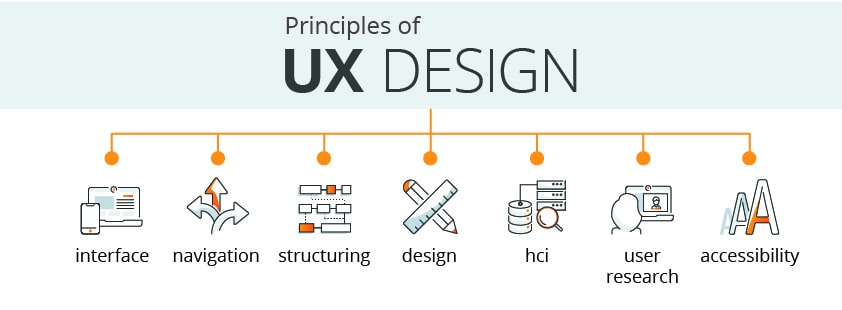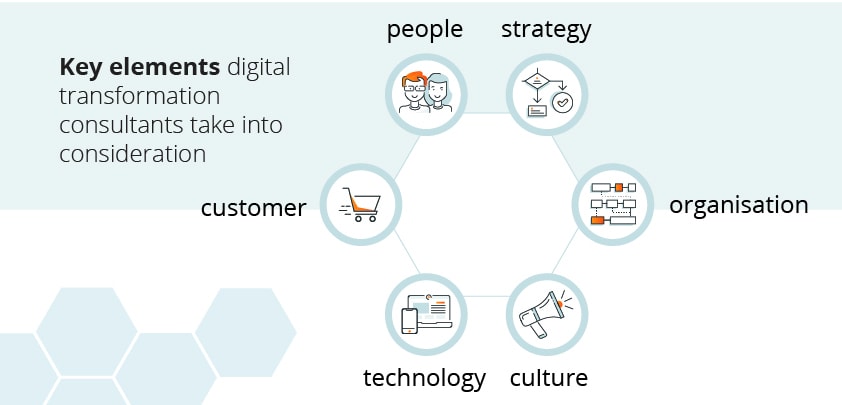
How to work effectively with a digital transformation consultant and what art has to do with it?
In March 2020, most of the world shut down for what we thought was going to be just a couple of weeks. For some time, the world as we know it stopped. And organisations that hadn't previously been regarded as the most digital-friendly were forced to reconsider their approach and operating model.
In March 2020, most of the world shut down for what we thought was going to be just a couple of weeks.
Businesses pivoted to online work almost from one day to another. Stores with non-essential goods were unable to move their stock for months. Food establishments needed to embrace delivery options in record time. The world of entertainment was brought to its knees, as most in-person events couldn’t go ahead.
For some time, the world as we know it stopped. And organisations that hadn’t previously been regarded as the most digital-friendly were forced to reconsider their approach and operating model.
Unexpected players in the digital transformation game
Surprisingly, there were also institutions, like museums and art galleries, that enormously benefited from that unprecedented challenge in the context of accelerated digital transformation.
They were able to do that by turning to professionals who correctly assessed their potential for scaling and recommended the best processes to effectively use digital technology to their advantage. If the British Museum hosting mostly antiquities could introduce digital innovations, so can your modern company.
But how to find the right consulting firm that will help transform your business effectively? That is the question!
Going digital with a digital transformation consultant
Many large enterprises, digital product companies of today, were once (and not so long ago, historically speaking) analogue. That means they relied on the “physical” aspects of their services or products, i.e. a flagship store or a call center, to run their operations.
The example of how IKEA, LEGO, or McDonald’s used modern technology to their advantage is surely impressive. But the world of art somehow couldn’t keep up with those digital trends. Even though virtual reality (VR) and augmented reality (AR) weren’t new concepts then anymore, museums started offering ”digital” tours of their premises, leveraging the new technology on a massive scale, only in the pandemic.
The Louvre in Paris, The Guggenheim in New York, or The Hermitage in St. Petersburg opened their doors virtually for an “on-demand culture fix”. That included appreciating revered masterpieces.
So even if you were not allowed to leave your home, you could travel virtually to Amsterdam in a few minutes and examine Van Gogh’s paintings up close from the comfort of your sofa.
Cultural change was happening in front of our eyes.
A digital art experience today
Partially because of lockdowns, cultural activities usually reserved for the wealthy, educated, or art connoisseurs became available to the wider public.
Museums, not the most exciting tour stops for younger generations, for instance, stepped up their digital game, suddenly becoming ”cool” and progressive instead of conservative and boring.
Those same organisations also invested in other customer experiences, like integrated availability calendars, diverse, interactive online resources, streamlined interactions with staff, educational webinars, etc. Wider application development was also observed in the pandemic.
Nowadays, most organisations in the cultural realm have an app that you can interact with on many different levels.
Why you can’t do the digital transformation alone?
All that didn’t happen in one day, however.
And it’s highly unlikely historians and scientists, traditionally concerned with preserving valuable artworks rather than creating or implementing new technologies, came up with all those useful, modern improvements.
It’s the broad expertise of digital transformation consulting services that made it all possible. Going it alone would be a daunting and time-consuming process.
There’s also no need for a UX design and software product development department in a cultural institution, focused primarily on the crossover between educational, aesthetic, and entertainment purposes. Outsourcing is, no doubt, the best way to go about it.
Read more:
- 10 benefits of Digital Transformation acceleration
- Roadmap for product development — what do you need to know?
- How to create a proof of concept in software development?
What does a digital transformation consultant do?
When museums were desperately looking for ways to survive and stay relevant during lockdowns, the digital tools and emerging technologies allowing them to take that step forward were already there. What art institutions needed at that time was business consulting to guide them through digital transformation.
And that’s what digital transformation companies do.
First and foremost, experts in that field help start-ups and large enterprises prepare an effective digital transformation strategy. They will go far beyond offering a virtual tour of the reception area of your firm, however.
Their role has more to do with sparking innovation and growth, without undermining your company’s profitability, reputation, and competitiveness in the market.
A digital transformation consultant’s analysis
Digital transformation consultants point out realistic business opportunities or suggest cost-effective solutions to enhance your existing workplace or boost your customer experience journey.
Their evaluation is based on a thorough analysis of available data and the digital capabilities of the institution in question. It’s something like SWOT for the digital era.
Things they will consider include:
- the organisation’s business model,
- its existing technologies and other related resources,
- its ability and readiness to scale,
- digital products already in place,
- the company’s target client group,
- any specific organisational structure, requirements or obligations,
- proposed budget,
- suggested timeline,
- desired outcomes, etc.
In other words, digital transformation consultants help companies embrace new technology and adapt to inevitable changes sparked by the 21st-century digital revolution.
The LinkedIn anti-example
In September 2020, jealous of the spectacular success of ephemeral content on Snapchat and other social media apps, LinkedIn introduced “Stories” on its platform. The feature, rolled out globally under the umbrella of “We can be useful in other ways”, was thought to be a big hit.
After all, it worked elsewhere. LinkedIn had all the tools, digital technologies, and resources at its disposal to make it happen. But the company didn’t exactly nail the business intelligence part of this digital innovation. Users were not thrilled because there was no real business value in the new feature.
It turned out that ephemeral content was not the most sought-after element of LinkedIn for busy business people and mature jobseekers. It wasn’t “useful to them in other ways”, unfortunately.
So that experiment, part of LinkedIn’s ongoing digital transformation project, was quite short-lived. The feature was entirely decommissioned barely a year later, never to be mentioned on the platform again.
The business outcomes of that decision were simply far from ideal. Despite the technological readiness, there was no clear-integrated strategy in LinkedIn’s move. Those digital transformation efforts should have been focused on other areas.
Is working with a digital transformation consultant a necessity or a “nicety” then?
We’re glad you asked because we know how this story goes.
Your organisation embraces change. Since you don’t want to stay behind in the innovation game, you’re willing to take the digital transformation initiative. And you’ve been thinking long and hard about using data and technology to maintain your competitive advantage.
You’re also aware of the business challenges in the context of the user-centered design process, which significantly increases customer satisfaction and engagement.
You might already have a proposal for an amazing digital product that will change your client’s life or enhance interactions in your organisation. All your employees are behind it, you have enough budget to make it happen, and your initial market analysis indicates you should absolutely go for it.
But how do you know it’s not going to be a total flop, like in LinkedIn’s case?
At this stage of the process, after all, it’s natural to subconsciously conduct a largely subjective preliminary research, looking for arguments in favour of that revolutionary idea of yours.
So yes, we certainly think that working with digital transformation consultants is a necessity in any business-led tech enterprise that wants to succeed. Especially if your goals are to invest your time and resources right.
See which areas we can help you with:
- Digital Transformation for the Insurance Sector
- Digital Transformation for the London insurers
- Digital Transformation for the Finance Sector
- and others – just let us know!
How about a discovery workshop?
Before taking any steps in implementing a digital transformation strategy, you need another pair of eyes.
Somebody external who will look at things from an objective point of view. A consulting company that will spot potential gaps in your plan. Not to torpedo it, but to make it a solid project from the start. A project apt for the digital experience of tomorrow.
That is why you should start working with digital transformation consulting companies from day one. There are different ways to do that. Our own Digital Product Discovery is a good idea for the first step.
This interactive process will not only help crystallize your vision but also ensure its perfect adjustment to your business objectives and customers’ needs. So that you can maximize projected benefits while minimizing potential risks in your digital journey.
This exercise will also unpack the principles of the agile governance mindset, which is another important element in any progressive business strategy today.
Finding the right digital transformation consultant also depends on you
These days, it’s important to find the right technology for your digital product in the first place. There are so many possibilities out there that every step of the decision-making process inevitably evokes the (in)famous FOMO (fear of missing out) effect.
This is exactly where hiring a digital transformation consultant can help.
However, the answer to the question of how to find the right one very much relies on putting in the work on your end. It will also depend on your approach to digital transformation and your organisation’s overall technical capabilities.
Best practices for working effectively with digital transformation consulting services
We get it, you are bombarded with offers of digital expertise from every possible direction. Everyone talks about “unlocking your business potential“, “benefiting your stakeholders“, or “revolutionising your customer experience journey“.
Instead of those big declarations, we have come up with four practical tips that can help you select and effectively work with the ideal candidate, according to your particular business needs.
1. Know your company first
Roughly but objectively, where do you sit on the scale analog – digital?
Are you somewhere in the middle or still heavily swaying towards the left side? Or maybe you’ve almost gone digital and just need some fine-tuning?
This part will determine to which extent you’ll need guidance in the digital transformation process.
So you can focus on looking for a business consultant that gets your journey.
2. Set yourself SMART digital goals
If you’re a small company in the urban mobility sector, aspiring to be Uber, BlaBlaCar, or Lime from the start will sooner or later lead you to Destination Frustration.
Instead, think of what’s possible and how to get there relatively quickly and painlessly.
When you know 100% what you want, realistically speaking, it will be easier to find a consultancy that understands your digital vision.
3. Welcome the unknown
Starting a business venture is risky enough. And when you need to completely reorganise something you only just got a hang of, it’s even scarier. Not everyone happily embraces change, either.
But that’s what digital transformation projects are all about.
It’s pretty much diving head first into the deep and murky waters of what lies ahead. But fear not – a good consultant will help you choose the right technology and adapt your technical possibilities of today to the digital needs of the future, keeping in mind your client’s expectations, too.
So that your start-up doesn’t stay behind in your respective professional field.
4. Expect the unexpected
When you’re so focused on achieving a massive, challenging professional goal, like digital transformation, it’s easy to forget about all the synergies that exist in the world today. No man is an island. And no “revolution” will be a success without impacting other aspects of your business.
For instance, have you thought about how ESG (the Environment, Social, and Governance criteria) and Digital Transformation go hand in hand?
Digital transformation consulting firms pay attention to all those essential regulatory details as well. So you don’t have to. A digital transformation journey is a cooperation between your enterprise and the consulting firm.
Whether you’ll eventually opt for implementing cloud computing, broadening your data analytics, or reorganising the supply chain management, those business processes will depend on both things equally.
Your company’s human and technical capabilities count as much as the professional efforts of the digital transformation consultancy.
Art at the forefront of digital transformation?
If you’ve never been to the famous Uffizi Gallery in Florence, where Michelangelo’s or Leonardo da Vinci’s works are displayed, you can change that with a click of a button. The museum offers a free virtual tour of its permanent collection. It will never beat the real experience, but it’s an important innovation, suited to the expectations of the 21st-century art consumer.
Traditionally, and up to the recent pandemic times, art had not been considered the most progressive of life disciplines when it comes to its accessibility and utility.
On the contrary, for many centuries, it had only been created with the rich and powerful in mind. Ironically, and whether we agree with it or not, the pandemic has democratized access to it. Moreover, digital art in the form of NFTs, for example, is now leading this modern revolution. And it looks like nothing can stop it now.
Conclusion
If the right digital transformation strategy worked wonders for museums, imagine what it could do for your fintech start-up!
So do not hesitate to speak to our consultants today about the range of digital transformation services we offer.
Let’s see together how we can best help you with a seamless and effective digital technology implementation.









